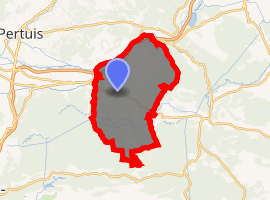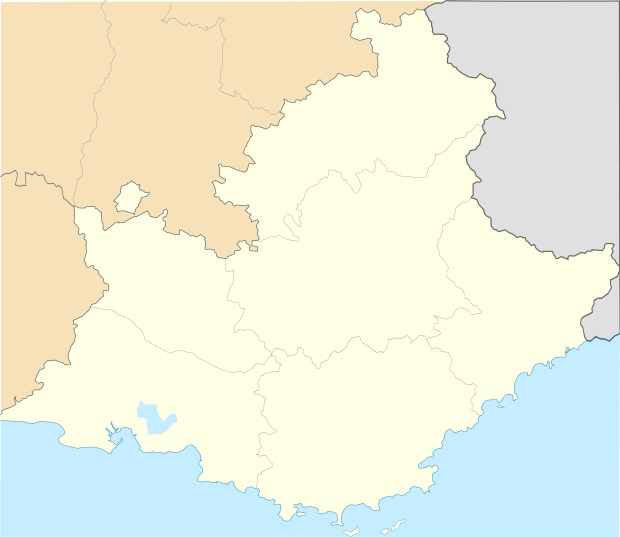Jouques
Jouques (Jocas in Occitan) is a commune in the Bouches-du-Rhône department in southern France.
Jouques | |
|---|---|
A view of Jouques | |
.svg.png) Coat of arms | |
Location of Jouques 
| |
 Jouques  Jouques | |
| Coordinates: 43°38′16″N 5°38′15″E | |
| Country | France |
| Region | Provence-Alpes-Côte d'Azur |
| Department | Bouches-du-Rhône |
| Arrondissement | Aix-en-Provence |
| Canton | Trets |
| Intercommunality | Aix-Marseille-Provence |
| Government | |
| • Mayor (2008–2014) | Guy Albert |
| Area 1 | 80.35 km2 (31.02 sq mi) |
| Population (2017-01-01)[1] | 4,413 |
| • Density | 55/km2 (140/sq mi) |
| Time zone | UTC+01:00 (CET) |
| • Summer (DST) | UTC+02:00 (CEST) |
| INSEE/Postal code | 13048 /13490 |
| Elevation | 209–782 m (686–2,566 ft) (avg. 363 m or 1,191 ft) |
| 1 French Land Register data, which excludes lakes, ponds, glaciers > 1 km2 (0.386 sq mi or 247 acres) and river estuaries. | |
Population
| Year | Pop. | ±% |
|---|---|---|
| 1793 | 1,700 | — |
| 1800 | 1,586 | −6.7% |
| 1806 | 1,542 | −2.8% |
| 1821 | 1,789 | +16.0% |
| 1831 | 1,832 | +2.4% |
| 1836 | 1,834 | +0.1% |
| 1841 | 1,775 | −3.2% |
| 1846 | 1,804 | +1.6% |
| 1851 | 1,827 | +1.3% |
| 1856 | 1,716 | −6.1% |
| 1861 | 1,684 | −1.9% |
| 1866 | 1,605 | −4.7% |
| 1872 | 1,493 | −7.0% |
| 1876 | 1,502 | +0.6% |
| 1881 | 1,504 | +0.1% |
| 1886 | 1,508 | +0.3% |
| 1891 | 1,506 | −0.1% |
| 1896 | 1,301 | −13.6% |
| 1901 | 1,344 | +3.3% |
| 1906 | 1,218 | −9.4% |
| 1911 | 1,130 | −7.2% |
| 1921 | 1,081 | −4.3% |
| 1926 | 1,022 | −5.5% |
| 1931 | 1,027 | +0.5% |
| 1936 | 934 | −9.1% |
| 1946 | 1,003 | +7.4% |
| 1954 | 1,004 | +0.1% |
| 1962 | 1,831 | +82.4% |
| 1968 | 2,047 | +11.8% |
| 1975 | 2,096 | +2.4% |
| 1982 | 2,238 | +6.8% |
| 1990 | 3,062 | +36.8% |
| 1999 | 3,262 | +6.5% |
| 2008 | 4,089 | +25.4% |
gollark: Not actually how it works or any details other than that it's hard to exploit.
gollark: I vaguely mentioned its existence to them.
gollark: The Nether might not even *have* GPS, but nobody cares.
gollark: The Overworld has really widely distributed GPS hosting, for example, so I think you'd have to run a ridiculous amount of probably low-ID computers and modems. Well, not that many, but... a few?
gollark: Unlikely too!
References
- "Populations légales 2017". INSEE. Retrieved 6 January 2020.
| Wikimedia Commons has media related to Jouques. |
This article is issued from Wikipedia. The text is licensed under Creative Commons - Attribution - Sharealike. Additional terms may apply for the media files.